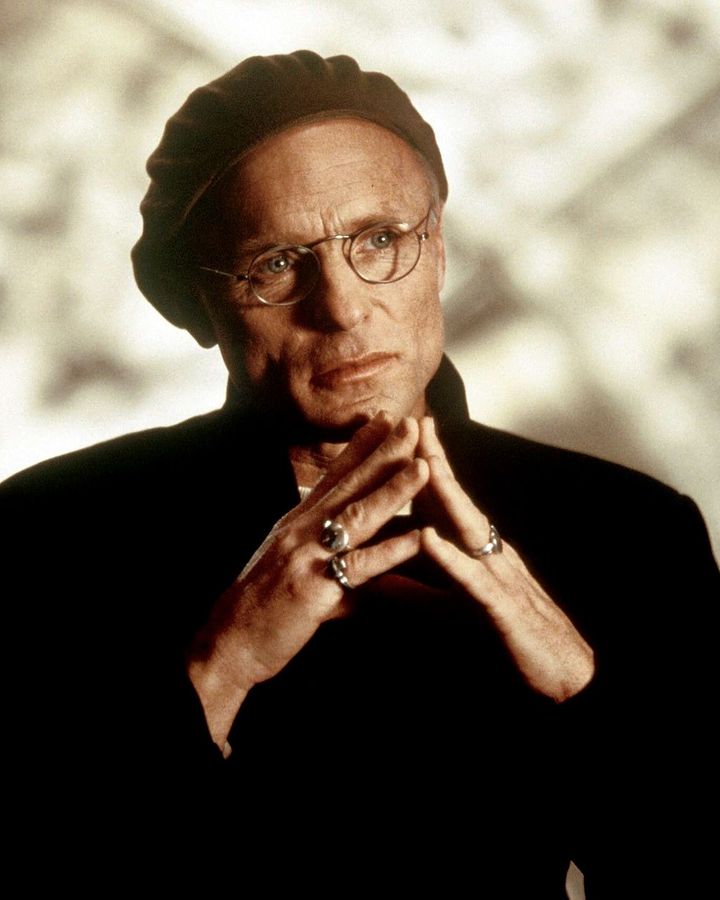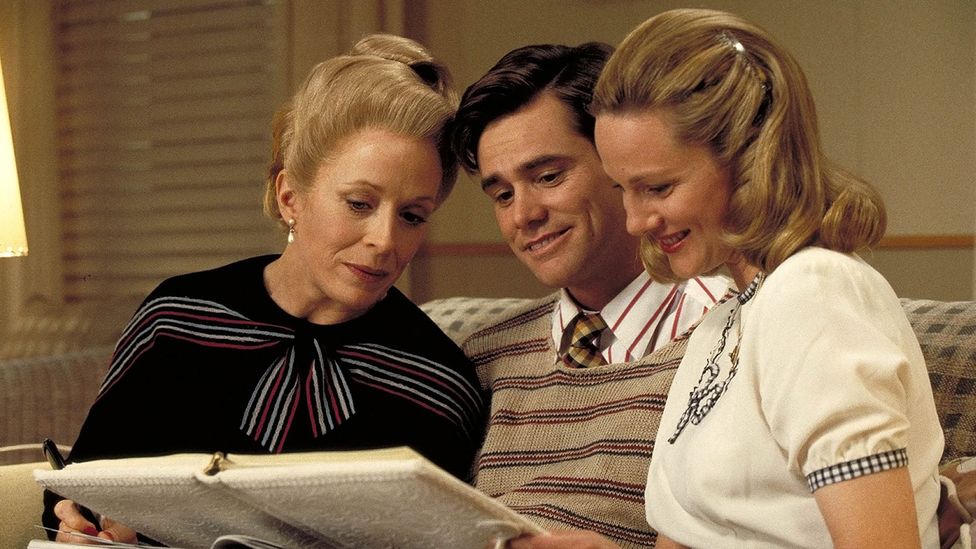The 1998 Jim Carrey film about a man whose entire life is filmed quickly came to embody a new age of reality television. And, 25 years on, it continues to resonate, writes Emily Maskell.
“Good morning, and in case I don’t see ya… good afternoon, good evening, and good night!” Truman Burbank (Jim Carrey) cheerfully calls out to his neighbour. It’s as predictable as the sun rising and setting, a part of Truman’s unchanging everyday routine. Little does he know his whole life is a lie that is being watched by millions. Released in 1998, the one-of-a-kind film Hollywood film – a satirical sci-fi psychological comedy-drama – about one man living in a fabricated reality concocted by TV producers made an impact on its release, but no one knew quite how prescient it would be. In subsequent years, it has come to embody a myriad of cultural anxieties – about omnipresent surveillance, mass voyeurism, and the reality TV craze that has swept the globe, with all the attendant existential quandaries of living for an audience.
Written by Andrew Niccol and directed by Peter Weir, the film grossed over $125 million in the US and around $264 million worldwide and garnered three Academy Award nominations for best supporting actor, original screenplay and director – but those statistics in themselves do not represent the extent of its impact. The prophetic film intricately chronicles the daily life of the eponymous clean-cut insurance salesman, Truman, who is totally unaware that his existence is the subject of a globally televised and ethically precarious show, his family and friends are actors, and the world around him is a manufactured facade. Chosen to appear from birth, Truman’s life is documented with 5000 cameras placed throughout his “hometown” of Seahaven Island that broadcast his life around the clock to a loyal 1.5 billion viewership.
At the time of production, the story of a man whose life is broadcast 24/7 to 1.5 billion viewers seemed improbable, even to those making it (Credit: Getty Images)
Then one fateful day, the lies of his existence begin to crumble after a series of accidental disruptions – including a lighting rig falling from the “sky” and Truman spotting his “dead” father alive – lead to an epiphany. However while Truman bravely decides to flee his constructed “reality” and run away from such manipulation, as a society we seem to have collectively headed in the opposite direction. Certainly, the film’s cautionary subtext went firmly unheeded, for media voyeurism has only become a more and more ingrained part of our lives.
Weir tells BBC Culture that despite the film’s remarkable and timely relevance, he had no expectation that The Truman Show would prove so on-the-money. “I had no idea the tsunami of reality TV lay just below the horizon,” he says. At the time of The Truman Show’s production, reality television was in its infancy, with shows like The Real World leading the way, but it was Dutch format Big Brother, in which ordinary people were made to share a house for a period of weeks, that would make the genre into a worldwide phenomenon.
The creator of Big Brother said something like: ‘When I saw Truman I thought we better get a move on’ – Peter Weir
In fact, Weir says he recalls a comment by the creator of Big Brother “[who was] in the planning stages [of the show] at the time of the film’s release. He said something like: ‘When I saw Truman I thought we better get a move on’. Big Brother came out a year or so later.” But The Truman Show’s sharp commentary on living under constant surveillance foreshadowed not only the reality TV age but the whole social media culture.
With the advent of Big Brother, The Truman Show seemed all too credible – but in the making of it, Weir says, the concept seemed a stretch to many involved: “The problem was we had to accept [The Truman Show] was watched by a worldwide audience for 30 years, 24 hours a day.” Now, such programming seems far less absurd, thanks not only the endless parade of reality shows but online streams on all manner of social media platforms in which users document lengthy periods of their lives for viewers to endlessly gawk at.
How real is ‘reality’?
Weir also hit the nail on the head when it came to the conventions of “unscripted” television, before these could even be described as such. As with all good reality TV shows, the Truman Show’s “reality” is really spun by producers dictating the happenings of Truman’s contained world. Christof (Ed Harris), the megalomaniac creator of the Truman Show, has a despotic eye that oversees everything, his power illustrated with his demand to “cue the sun!” Encounters with passers-by and acquaintances are minutely rehearsed so Truman’s interactions with the world seem organic. The collective desire to observe a mundane “reality” is outlined by Christof in the film’s opening moments: “We’ve become bored with watching actors give us phoney emotions… While the world he inhabits is in some respects counterfeit, there’s nothing fake about Truman himself.
That ambiguity over what is “real” and what is counterfeit lies at the heart of today’s slippery media culture, from The Kardashians to Instagram Lives. Just as audiences crave reality, that “reality” fed to them can be questionable in its authenticity, adulterated with producers’ instructions, product placement, social media filters et al. Meanwhile those who participate in reality TV mostly exhibit some level of performativity due to their awareness that cameras are following them – which is where, of course, they differ from the innocent Truman. Regardless of participants’ complicity or not, however, as with The Truman Show, these shows feed off the desire of audiences to vicariously inhabit other people’s “real” lives.

The man pulling the strings in the film is manipulative show creator and producer Christof (played by Ed Harris) (Credit: Alamy)
Indeed, The Truman Show’s layered show-within-the-film narrative also comes to tackle the very existential, epistemological question of what we understand as “real”. It recalls the allegory of Plato’s cave, in which he describes a situation where people who have been chained up in a cave all their lives see shadows projected onto the opposite wall that become “real” for them – even though they are not accurate representations of the real world.
The Truman Show can be interpreted as a modern reflection of this idea, as distilled by Christof when he proclaims: “We accept the reality of the world with which we’re presented. It’s as simple as that.” The same arguably could be said for 21st Century audiences in general; like Truman, we’re presented with a reality that in many ways could be understood as orchestrated. Online identities and reality TV are a “truth” created through heavy editing just like Truman’s life is heavily contrived. The world Christof has built is Truman’s truth, Truman’s cave, and we’re all in echo chambers and caves of our own truth too.
The film makes a strong case for this sense of the growing impossibility to separate entertainment and reality – Lilia Pavin-Franks
The Truman Show also formulates how life can be lived for the entertainment of others. Now, we can all become Trumans thanks to widespread access to online platforms. The phenomenon of self-broadcasting has proliferated in our self-narrativising society; you can provide an unending soap opera stream of life to an audience online via Twitter, Instagram, Facebook, TikTok and many more. We can all, too, indulge in the much-derided Main Character Syndrome – a social media shorthand for those who narcissistically imagine themselves as the protagonist in their own life story, with the people around them as supporting characters.
“I think [the film] makes a strong case for this sense of the growing impossibility to separate entertainment and reality,” film programmer and writer Lilia Pavin-Franks tells BBC Culture. “Perhaps audiences have an affinity for reality TV because it gives a sense of relatability, but at its very core, reality TV still remains entertainment first and foremost.” Pavin-Franks highlights the complicated relationship between viewer and participants at the core of The Truman Show’s story and reality TV generally. How does the former view the latter – as empathetic subjects, enjoyably manipulated objects or both? Whatever the nature of the bond, certainly it can be a strong one: according to a 2016 study by market research agency OnePoll, “almost 1 in 5 of those surveyed have revealed they have grown attached to a reality star or character, with 1 in 10 admitting to becoming obsessed with a reality show”. This extracts the idea of a participant being perceived as a consumer product: it appears in Weir’s film in the way the audience buy into the character of Truman with Truman-themed merchandise. But there’s also something enraptured about the way they watch him, from their sofas, in bars, and even in the bathtub, 24 hours a day – a profound collective experience.
The Truman Show Syndrome
The Truman Show’s continued cultural resonance can be seen very concretely in the emergence of “Truman Show Syndrome”, a term coined in 2008 by psychiatrist Joel Gold and his academic brother Ian Gold to describe patients who believed they were being documented for the entertainment of others. Ian Gold, Associate Professor of Philosophy and Psychiatry at McGill University, tells BBC Culture that though the film “captured a salient moment in the history of technology, and resonated with the experience of many people”, it was not the singular cause of the delusion. Instead, the impact of the film intersected with mounting surveillance within Western culture. “Following 9/11, the Patriot Act made surveillance a salient feature of American culture, and that was probably an important contributor to the general anxiety around loss of privacy,” he adds.
One can then assume that the widespread access to mobiles and social media would only have elevated Truman-like anxieties further. That is certainly the belief of Dr Paolo Fusar-Poli, Professor and Chair of Preventive Psychiatry in the Department of Psychosis Studies at King’s College London, and co-author of research on the Truman Show Syndrome phenomenon published in the 2008 British Journal of Psychiatry. Dr Fusar-Poli tells BBC Culture: “Certainly, the profound recent digitisation and hyper-exposure of our lives on social media could trigger these [Truman-like] experiences.” Professor Gold furthers that “cultural realities are always intruding into psychotic experience,” and therefore the transition to a highly digital life could heighten paranoia surrounding surveillance.
In Truman’s world, everyone is in fact an actor, from his mother (Holland Taylor, left) to his wife (Laura Linney, right) (Credit: Alamy)
Both Gold and Fusar-Poli speak to The Truman Show’s relevance to modern identity but Weir also points to the fact that the film speaks to a more fundamental paranoia, irrespective of current cultural trends. When he met actors auditioning for the film, he reveals, several confided they identified with Truman because in their youth they’d felt like “a fraud, [with] everyone around them acting”.
Though the rise of reality TV and social media very obviously cemented the film’s legacy as one for the ages, Weir still expresses his surprise at The Truman Show’s “enduring” relevance: “It seems to appeal to a young audience which is unusual for a film older than they are,” he says. The Truman Show concludes with Truman finding a skywards escape through an empyrean doorway of darkness – the opposite of light at the end of the tunnel. Nevertheless, there’s a semblance of hope in the open-ended conclusion – hope that Truman can go on to live his life without the uneasy presence of a ubiquitous audience. Truman’s example is one that, some would suggest, our society as a whole would do well to finally take on board.
DISCLAIMER: The Views, Comments, Opinions, Contributions and Statements made by Readers and Contributors on this platform do not necessarily represent the views or policy of Multimedia Group Limited.
